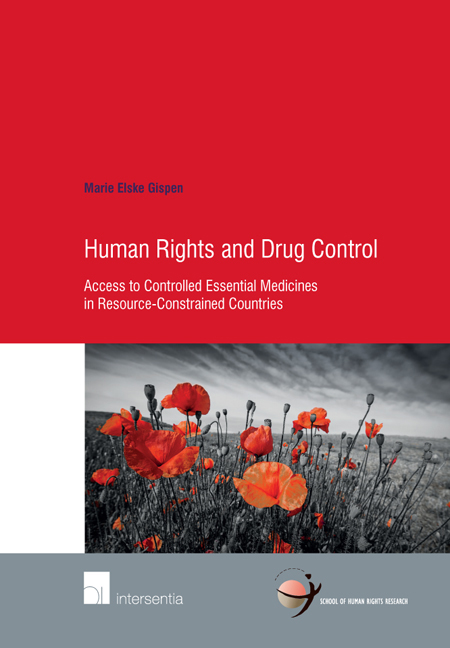 Human Rights and Drug Control
Human Rights and Drug Control Book contents
- Frontmatter
- Acknowledgements
- Contents
- List of Abbreviations
- Table of Instruments
- Table of Cases
- List of Figures and Tables
- Part 1 Concept and Problem
- Part 2 Normative Framework
- Part 3 Country Studies
- Part 4 Conclusions and Recommendations
- Chapter 8 Conclusions and Recommendations
- Appendix I Interview Protocol Uganda
- Appendix II Interview Protocol Latvia
- Samenvatting (Dutch summary)
- Selected Bibliography
- Index by Paragraph
- Curriculum Vitae
- School of Human Rights Research Series
Chapter 8 - Conclusions and Recommendations
from Part 4 - Conclusions and Recommendations
Published online by Cambridge University Press: 27 September 2018
- Frontmatter
- Acknowledgements
- Contents
- List of Abbreviations
- Table of Instruments
- Table of Cases
- List of Figures and Tables
- Part 1 Concept and Problem
- Part 2 Normative Framework
- Part 3 Country Studies
- Part 4 Conclusions and Recommendations
- Chapter 8 Conclusions and Recommendations
- Appendix I Interview Protocol Uganda
- Appendix II Interview Protocol Latvia
- Samenvatting (Dutch summary)
- Selected Bibliography
- Index by Paragraph
- Curriculum Vitae
- School of Human Rights Research Series
Summary
Recalling the questions and ambitions of this book
Concerned with the access to controlled essential medicines under the interplay of human rights and drug-control norms, this study explored a human rights approach to the international drug-control system. Analysing the availability and accessibility of these medicines in theory and practice, the book used morphine as essential paincontrol medicine as leading example. In its analysis, both a general focus on controlled essential medicines, as well as a more applied focus on pain-control medicines, was employed.
As described in Chapter 1, Remedios was lucky to receive palliative care and paincontrol treatment at Mexico's National Cancer Institute. Unlike Remedios, millions of patients around the world continue to suffer in dire conditions, as pain-control medicines like morphine and codeine remain largely unavailable or inaccessible. In fact, despite their multifaceted need, Duthey and Scholten concluded that 66 per cent of the global population are unable to access, for whatever reason, opioid analgesics. Even though the authors found the global unavailability of opioid analgesics to affect all levels of development, the deficit is worst in Low- and Middle-Income Countries and, in particular, in the Sub-Saharan region. The suffering caused by the unavailability and inaccessibility of pain-control treatment raises serious concerns in light of human rights protection. States, after all, have the obligation to respect, protect, and fulfil the right to health and the prohibition of torture and cruel, inhuman, and degrading treatment (CIDT).
While there are many general and substance-specific factors challenging the access to medicines, the provision of controlled essential medicines is particularly influenced by the international drug-control treaties. Taking into account the multifaceted complexity of health-service provision, and the general and specific conditions in which to provide for pain-control medicines, this book examined the international drug-control treaties as a potential barrier. Despite States’ obligation to ensure access to medicines in adherence to the regulatory monitoring requirements enshrined in the international drug-control system, the normative foundation, interpretation, application and implementation of said system may raise questions regarding States’ obligations under human rights law.
The dual nature of controlled substances makes it imperative to regulate their production, manufacturing, import/export, distribution, and use. The question being, however, how far regulation should and can go, both in terms of scope and level, to ensure the availability of controlled essential medicines. This issue was found particularly acute for two distinct reasons.
- Type
- Chapter
- Information
- Human Rights and Drug ControlAccess to Controlled Essential Medicines in Resource-Constrained Countries, pp. 291 - 312Publisher: IntersentiaPrint publication year: 2017


